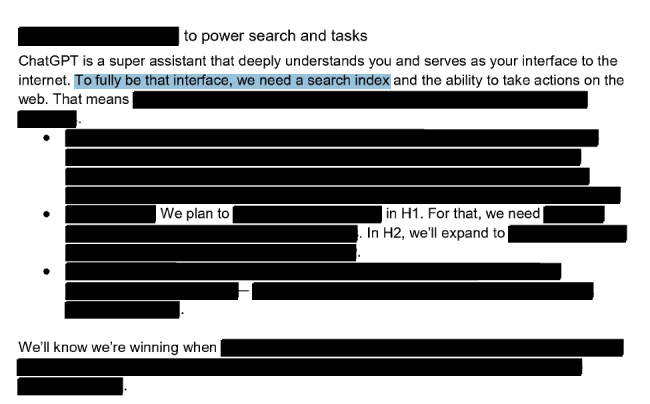OpenAI sees human interaction as a competitor to ChatGPT's super assistant ambitions

An internal strategy document reveals how OpenAI plans to turn ChatGPT into a ubiquitous super assistant by mid-2025, serving as a personalized gateway to the entire internet.
According to a confidential roadmap for the first half of 2025, which surfaced as part of the antitrust case between Google and the US Department of Justice (via The Verge), OpenAI's goal is to build an "intuitive AI super assistant" that handles tasks, takes action on behalf of users, and moves seamlessly across different channels, essentially serving as a personalized interface for everyday digital life.
Not a search engine, not an operating system—"just ChatGPT"
OpenAI describes its vision as an "intelligent entity with T-shaped skills"—"an entity because it's personalized to you and available anywhere you go—including chatgpt.com, our native apps, phone, email, or third-party surfaces like Siri."
The "T-shaped" concept means ChatGPT offers broad support for daily tasks like answering questions, managing calendars, planning vacations, or sending emails, while delivering deep expertise for complex challenges such as coding.
On the technical side, OpenAI is betting on next-generation reasoning models like o3, which, according to the document, are "finally smart enough to reliably perform agentic tasks." Tools like "Computer Use" are intended to expand ChatGPT's ability to take direct actions. As OpenAI puts it, "multimodality and generative UI allow both ChatGPT and users to express themselves in the best way for the task."
OpenAI sees human interaction as part of ChatGPT's competition
Despite these new features, OpenAI is careful to say it doesn't want ChatGPT to be seen as a search engine or an operating system. Instead, the company aims to establish a new category: a personal AI agent that guides users through the digital world. The ultimate goal is for ChatGPT to become the main entry point for daily digital life. As the document puts it: "That's why we don't call our product a search engine, a browser, or an OS—it's just ChatGPT."
OpenAI breaks down its competition into two groups. In the near term, rivals include other AI chatbots like Claude, Gemini, or Copilot. In the "broader game," traditional search engines, browsers, and "even interactions with real people" are considered competitors.

One competitor—whose name is redacted in the document—is described as especially threatening, since, unlike Google, it can embed its own AI systems into products without worrying about business model cannibalization. This likely refers to xAI's Grok, which is already integrated into X and other platforms.
OpenAI highlights several strategic advantages: "We have what we need to win: one of the fastest-growing products of all time, a category-defining brand, a research lead (reasoning, multimodal), a compute lead, a world-class research team, and an increasing number of effective people with agency who are motivated to ship. We don't rely on ads, giving us flexibility on what to build. Our culture values speed, bold moves, and self-disruption. Maintaining these advantages is hard work but, if we do, they will last for a while."
OpenAI may be building its own search index
For 2025, OpenAI plans to build two "moats," protective mechanisms intended to boost daily usage and position ChatGPT as a clearly superior assistant. While the expected outcomes are outlined, the actual strategies behind these moats remain redacted in the document.
A key part of the strategy appears to be the development of a dedicated search index. The document states: "To fully be that interface, we need a search index and the ability to take actions on the web." OpenAI may begin rolling out this feature in the second half of 2025, although many details remain undisclosed.

OpenAI is also urging major tech companies to give AI assistants like ChatGPT access to their search indices, warning that it faces "powerful incumbents who will leverage their distribution to advantage their own products."
Monetizing new features isn't part of the strategy for the first half of the year. For now, OpenAI's focus is on driving enough usage to test new revenue models in the second half of 2025. The company is expected to explore new business models for free users next year.
AI News Without the Hype – Curated by Humans
As a THE DECODER subscriber, you get ad-free reading, our weekly AI newsletter, the exclusive "AI Radar" Frontier Report 6× per year, access to comments, and our complete archive.
Subscribe nowAI news without the hype
Curated by humans.
- Over 20 percent launch discount.
- Read without distractions – no Google ads.
- Access to comments and community discussions.
- Weekly AI newsletter.
- 6 times a year: “AI Radar” – deep dives on key AI topics.
- Up to 25 % off on KI Pro online events.
- Access to our full ten-year archive.
- Get the latest AI news from The Decoder.